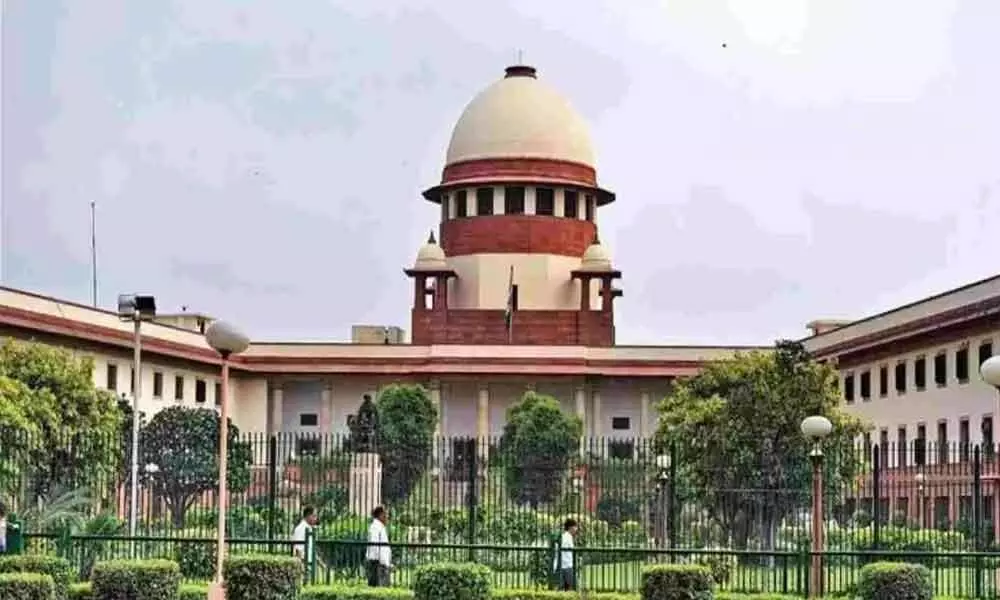Supreme Court to hear plea for 'uniform grounds of divorce' for all citizens

Supreme Court
Hindus, Buddhists, Sikhs and Jains have to seek divorce under the Hindu Marriage Act, 1955. Muslims, Christians and Parsis have their own personal laws. A couple belonging to different religions has to seek divorce under the Special Marriage Act, 1956
New Delhi: The Supreme Court on Wednesday agreed to hear a plea seeking "uniform grounds of divorce" for all citizens of the country keeping with the spirit of the Constitution and international conventions.
A bench of Chief Justice S A Bobde and Justices AS Bopanna and V Ramasubramanian orally observed that it may consider prayer for directing the Law Commission of India to examine the laws relating to divorce and suggest 'Uniform Grounds of Divorce' for all citizens in spirit of Articles 14, 15, 21, 44 of the Constitution within three months. The top court issued notice to the Centre on the plea and sought its response. At the outset, the bench told senior advocate Pinky Anand, appearing for petitioner Ashwini Upadhyay that whether she wants all personal laws should be abolished? Anand replied that no, she is not saying that.
The bench said that she is asking the court to direct something which amounts to go into personal laws and demolish them. It said that the Government is supposed to have a pulse of the people but does a court encroach on personal law like this. It asked Anand, "Can we remove the discriminatory practices without demolishing the differences in personal laws?"
The bench referred to the Triple Talaq case and said that Parliament has brought a legislation on it. Anand submitted that the practice of Triple Talaq was found to be discriminatory and was struck down by the apex court. The plea filed by Upadhyay sought directions to the Centre to take steps to remove anomalies in divorce laws and make them uniform for all citizens, without any prejudice on the basis of religion, race, cast, sex or place of birth.
"The court may declare that the discriminatory grounds of divorce are violative of Articles 14, 15, 21 and frame guidelines for 'Uniform Grounds of Divorce' for all citizens. "Alternatively, this court may direct the Law Commission to examine the laws of divorce and suggest 'Uniform Grounds of Divorce' for all citizens in the spirit of Articles 14, 15, 21, 44 within three months, while considering international laws and international conventions," the plea said. "Hindus, Buddhists, Sikhs and Jains have to seek divorce under the Hindu Marriage Act, 1955. Muslims, Christians and Parsis have their own personal laws. A couple belonging to different religions has to seek divorce under the Special Marriage Act, 1956," it said.. If either partner is a foreign national then that person has to seek divorce under the Foreign Marriage Act, 1969. Hence, the grounds of divorce are neither gender neutral nor religion neutral, the plea said.
The PIL said that the "injury" caused to the public due to this is large because divorce is among the most traumatic misfortunes for both men and women, but even after 73 years of independence, divorce procedures are very complex in the country. "Hence, grounds of divorce are neither gender neutral nor religion neutral. For example, adultery is a ground of divorce for Hindus, Christians and Parsis, but not for Muslims. Incurable leprosy is a ground of divorce for Hindus and Christians, but not for Parsis and Muslims. "Impotency is a ground of divorce for Hindus-Muslims, but not for Christians-Parsis. Underage marriage is a ground of divorce for Hindus, but not for Christians, Parsis and Muslims," the plea said.

